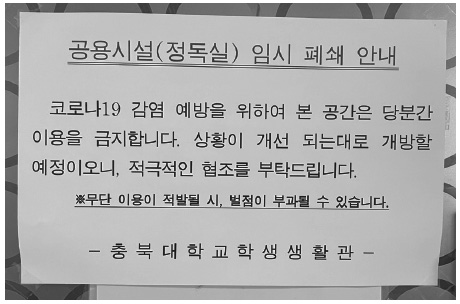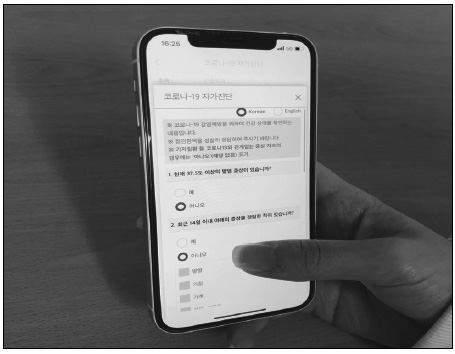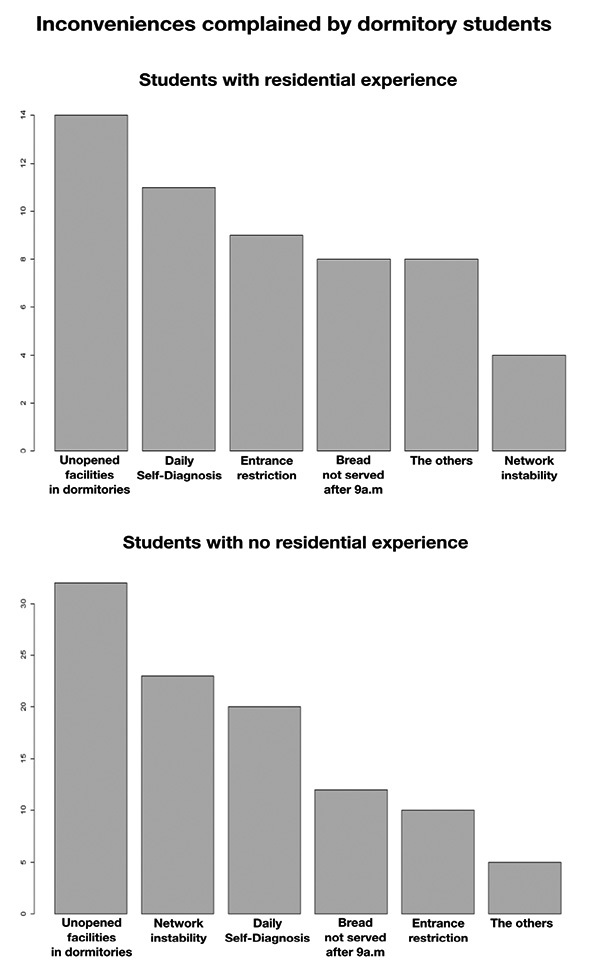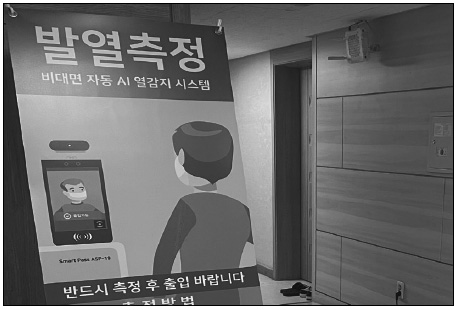In March 2021, CBNU was crowded by students returning for the start of class. There were a lot of students who had face-to-face classes or preferred to study at school even though most classes would be untact due to COVID-19. It comes as no surprise that dormitories, above all, were the most crowded places on campus. Last year the CBNU dormitories were mostly single occupancy instead of the original double occupancy for collective COVID-19 infection prevention. Students were also given the option to choose a preset occupancy period for example in the case of a face-to-face exam. However, starting this year, the dormitories reverted to double occupancy like before the COVID-19 occurrence, so more students moved into the dormitory than last year. The situation of COVID-19 has not improved much, but the dormitory was filled to maximum capacity, which caused students to complain of various inconveniences.
According to the online survey posted on the “Everytime Application” for CBNU students living in a dormitory in March 2021, students now face a variety of challenges in the dormitories. The survey was conducted by dividing students into two groups. First, new students who moved into the dormitories for the first time this semester and second, students who have experienced dormitory residence previously. According to the the survey, both group’s biggest gripes were the inconvenience of not having access to normal dormitory facilities. Currently, shared-use facilities in the dormitories include a laundry room in each dormitory, a bathroom, and a shower stall in the main dormitory. Because the dormitory originally offered rooms with double occupancy before COVID-19, students conducted personal matters, like making phone calls, in the lounge. Students also used the reading room or book cafe in the dormitory for studying at night in consideration of a roommate. Also, students who wanted to exercise or work-out could use the training room. However, currently, facilities like the lounge, reading room, book cafe, and gym can’t be used because of the risk of mass infection.
In this regard, students complained “Why not open the reading room if everyone agrees to wear masks like in the library? It is better to open the dormitory facilities with definite quarantine rules, because otherwise students are forced to use study cafes or regular cafes instead of the reading room and go to external fitness centers instead of those provided by the dormitory.” Also, a student suggested installing temperature sensitive cameras or measuring instruments at the entrance of all facilities as well as enforcing social distanced seating to combat COVID-19.
The second biggest response was in connection with self-diagnosis. Students who currently live in the dormitory have to do a self-diagnosis through the CBNU application even though they aren’t located in the dormitory. However, there were many opinions about the self-diagnosis procedure, including that the questions are mere tokens and that the tests are executed without seriousness. Also, there was the opinion that the number of self-diagnoses tests should be reduced to once a week. Students argue that doing the self-diagnosis every day, even in the absence of symptoms, is needless.
The third biggest response was about the instability of internet connection in the dormitories. Students have to, now more than ever, use the internet to participate in classes and do online research for homework and other projects. This is because most classes are untact due to COVID-19. Especially, when real-time classes are conducted via video conference applications like Zoom, depending on the stability of the network, classes may lag, or on severe occasions, applications suddenly turn off and participants are ejected from their classes. For this reason, there are students who are often at risk of being marked absent. Besides, real-time classes, internet instability is still a problem, where students who have to attend recorded lectures experienced difficulty because the lectures do not play smoothly. As a result, many participants insisted that they upgrade the routers as soon as possible.
CBT reporters met Jung Tae-jin, administration team leader of the dormitories to convey the feelings and frustrations of the students. First, regarding the facilities, the perusal rooms of Yang-jin-jae and Yang-sung-jae are located above ground while the perusal room of the main dormitory (Gae-sung-jae and Gye-yeong-won) is located underground. According to Mr.Jung, whether to open the perusal rooms or not depends on the location of the rooms because the underground room has difficulty in complete ventilation; and incomplete ventilation can lead to a high risk of collective infection. Second, about the self-diagnosis, he explained that he can not change the vague questions of the self-diagnosis because they are set by the university, not by the dormitory. Also, some students asked for an exception to be made so that they don’t have to perform a self-diagnosis when staying out overnight. He answered, “If there are students in a bad condition, we should contact him or her and give guidence on what to do even when they are staying at home. In reality, there was a student who seemed to have crossed paths with a confirmed positive case of COVID-19 during a night out, so we isolated both him and his roommate respectively and provided their meals in the room.”
In case of the internet instability, He said, “We are well aware of the problem and looking for a way to solve it. I just want the students to know that we are making up for it.”
To prevent the collective infection of COVID-19, the dormitory is responding stronger than the government’s requirements; including the closure of some facilities, requiring daily self-diagnosis, etc.
The CBT reporters also interviewed Jang Yoon-suk, an epidemiological investigator, to see if the policies of the dormitory are helpful to reduce the chances of infection. Her answers about students’ complaints and several opinions are as follows. At first, frequent ventilation is very helpful to reduce the risk of infection. However, it is hard to decide whether to open the facilities simply based on the ventilation availability because many factors are affecting the incidence of infections; such as the number of people in the place, whether it is allowed to have a conversation or not, the distance between people, ventilation management, etc. Second, the self-diagnosis which can check one’s abnormal symptoms is a recommendation from the quarantine authorities since it is effective to discover patients. While some students asked to lessen the number of times from once per day to once per week, it is difficult to be aware of the minor symptom unless they daily confirm their condition themselves. This could cause a delay in discovering patients and would make the self-diagnosis useless.
The CBT reporters visited the dormitory restaurant and could see that before entering, students check their body temperature, do the hand sterilization, and then had autonomous meals. Since the restaurant is a place that many people gather without wearing masks, the CBT reporters asked her if there are methods to prevent the infections during meal times. Most of the contents of the answers were already recommended by the dormitory restaurant. Additionally, she said that using poly gloves while distributing food could reduce the contamination caused by insufficient hand sterilization. However personal hygiene practices like not touching one’s eyes, nose, and mouth with hands and washing hands after a meal, are enough to prevent the transfer of infection by hands even though they don’t use poly gloves.
Previously, many students had inconveniences before the COVID-19 situation, but those were mostly about internet instability. Especially nowadays, several changes caused by the COVID-19 provoked a lot of complaints from students. However, the CBT reporters found that the university is responding above and beyond what the government policies require in order to reduce the infection risks. The CBT reporters also found that the dormitory management and staff were fully aware of the problems, complaints and appeals of the students. Unfortunately, the problem remains that students are prohibited from using every facility in the dormitory even though they still have to pay the same as before. Jung Tae-jin asked for understanding by saying, “We are trying our best not to induce collective infection in the dormitory. Also, we are aware of students’ complaints and doing our best to solve the problems. I hope students understand this.”
By Park Ji-min l jm41@cbnu.ac.kr
By Choi Yeong-eun l duddms8640@cbnu.ac.kr


 All
All Campus News
Campus News






 Park Ji-min&Choi Yeong-eun
Park Ji-min&Choi Yeong-eun











